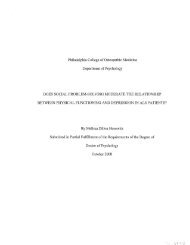0 - Philadelphia College of Osteopathic Medicine
0 - Philadelphia College of Osteopathic Medicine
0 - Philadelphia College of Osteopathic Medicine
Create successful ePaper yourself
Turn your PDF publications into a flip-book with our unique Google optimized e-Paper software.
Biopsychosocia\ Effects Among Coronary Artery Bypass Grafting Patients 54<br />
on this measure was significant. This suggests there were some high scores that could<br />
have pulled the weighted average. Therefore it is assumed then that overall pain scores<br />
were not as previously hypothesized.<br />
General Outcomes & Most Notable Findings<br />
The current study demonstrated the degree to which demographics influence the<br />
relationships or lack there<strong>of</strong> among the variables. This sample was 77% male, 90%<br />
Caucasian and 65% <strong>of</strong> the sample was married. These findings may hardly be<br />
generalized among all populations considering the fact that most research shows that<br />
women and those who do not have spouses are at greatest risk for pain, depression, and<br />
poorer outcomes (Stenlund, Lindstrom, Granlund, & Burell, 2(05). In addition,<br />
individuals from lower economic incomes traditionally show unfavorable outcomes<br />
because they lack resources (Rozanski, Blumenthal, & Kaplan, 1999; McCabe, et a1.,<br />
2(00). Considering this, it is likely that the results from this sample were skewed toward<br />
those who had the means to participate, were likely doing better, and showed more<br />
favorable results. This finding was also supported by the overall link between coping and<br />
quality <strong>of</strong> life.<br />
A secondary principal components analysis examined the overall relationship<br />
between the measures for variance within the study. Most notable was the factor analysis<br />
between The Brief Cope (problem and emotion focused) Scale and The MacNew Heart<br />
Disease Health Related Quality <strong>of</strong> Life measure. This finding is supported among the<br />
research, partiCUlarly within medical populations (Bruce et aI., 2003) Studies have clearly<br />
shown that patients who cope better <strong>of</strong>ten report feeling more satisfied with their lives<br />
and with outcomes (Rose et aI., 2005; Rao et aI., 2003; Rumsfeld, Magdid, & O'Brien,






